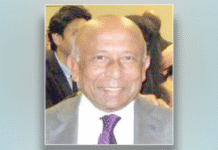Each refugee exodus looks different—in the numbers of human beings and the duration of their journey, in the acts of violence and atrocity, in the intensity of human suffering. Responses differ in the receiving country and the international community to the needs of the refugees; prospects for durable solutions depend on each situation. Throughout my extensive career with the UN refugee agency UNHCR, I had the opportunity to witness some of the most complex refugee situations globally.
In all the above respects, the predicament of the large influx of Rohingya refugees from Myanmar to Bangladesh in recent months must rank among the most difficult and complex refugee situations witnessed by the international community. The unending flow of emaciated, weary and hungry men, women and children, trudging through mud and torrential rain as they enter Bangladesh, having walked for days and nights through hostile and dangerous terrain, with hardly any belongings, makes the Rohingya crisis one of the most painful in human history.
They have been greeted by unmistakable displays of heart-warming compassion and hospitality. The Rohingya refugee crisis should become known for its paradoxical mix of the most intense human suffering of the arriving refugees and the most generous hospitality of the government and people of Bangladesh. This spontaneous and unflinching response should go into the annals of refugee history as a shining example of humanitarianism.
In doing what they did, the people of Bangladesh were mindful of the generous hospitality that ten million Bengali refugees from the then East Pakistan had received in the neighbouring states of India during our liberation struggle in 1971. Our neighbours received us with open arms; we must do the same for the Rohingyas. It is an essential element of the humanitarian tradition of our region.
Beyond this generous immediate help, there is the need for a durable solution. This is where Bangladesh needs help from all concerned: from Myanmar as the country of origin of the refugees, and from our other immediate neighbours, India and China, both of whom have a stake in resolving the crisis. I would underline the word “stake.”
In my long UN career, I have seen how political short-sightedness of governments have led to protracted refugee crisis and the resulting insecurity and instability not only for the receiving and sending countries, but also for the region. This must not be allowed to happen.
The refugees who are arriving in Bangladesh today are all worried that they may not be able to go back to their country at all. Such feelings breed frustration, despair and hopelessness. There are many instances where protracted refugee situations have led to armed struggles that have not only destabilised the lives of the refugees but also shaken entire countries and regions.
I have worked with Palestinian refugees in Gaza and across the Middle East and learnt firsthand of their aspirations to return to their homeland, which have remained unrealised since 1948. The loss of human lives and the continuing violence that affect both the Palestinian territories and Israel must constantly remind us of the need to find early solutions to large refugee problems.
A relatively smaller number of Rohingya refugees came to Bangladesh at various times since the late 1970s and early 1990s, when I had the opportunity to deal with them. Most of them went back but many remained and some had spread out to various parts of the world. Some of them, I later learnt, joined the Taliban forces as mercenaries in Afghanistan. We now hear that some Rohingya refugees abroad were behind alleged attacks on police stations in late August 2017, which reportedly triggered the military operations in Myanmar. They may wish to carry on their struggle, should they feel compelled.
It does not require much to imagine the situation likely to arise if close to a million Rohingya refugees, reportedly in Bangladesh today, including those who trickled back to Bangladesh intermittently over the years, find themselves living in overcrowded refugee centres with no hope of a solution. Surely, they are not going to remain in such impossible circumstances indefinitely. What would be the alternatives for them?
Such large numbers can surely not be locally integrated. Nor can they resettle in third countries without attracting those remaining in Myanmar to follow the path. One alternative would then be to join those who see their only choice is to take up arms to reclaim their rights in Myanmar. The latter’s ranks would thus swell. They will have no dearth of sympathisers to support their cause from all over the world. The fleeing IS and Al Qaeda forces from the Middle East and Afghanistan are looking for causes to join. And many would support them financially and otherwise. The refugees must be spared from such radicalisation.
I have seen in my recent work as UN Special Rapporteur in Somalia how the so-called Al-Afghanis, members of defeated Al Qaeda forces fleeing Afghanistan and Pakistan, joined forces with Al-Shabab and destabilised and devastated that entire country. Such a scenario must be averted in South Asia.
The Bangladesh government is known for its resolve to fight all types of terrorism—Islamist or otherwise—on its territory. If liberation forces develop in camps in Bangladesh, they would certainly be dealt with severely by Bangladesh forces. Where would they go then? Their guerrilla activities would certainly spill over into India and Myanmar, and possibly elsewhere. If that happens, all efforts of Myanmar to stabilise the Rakhine State for development and progress is bound to flounder. This will also affect the hopes of India and China to become Myanmar’s partners for development in the concerned region.
The only win-win situation for all the protagonists would be to find an amicable solution where the voluntary return of the refugees to their homeland and recognition of their status under the laws of Myanmar are ensured. This has been recommended by the Kofi Annan Commission, endorsed by Myanmar’s Nobel Laureate leader, Aung San Suu Kyi, and supported by the international community.
This brings me to India’s role in the process. India’s initial reaction, to side with Myanmar’s position, immediately after the military crackdown on the Rohingyas that triggered the recent refugee flow, caused a great deal of consternation in Bangladesh. This does not augur well for the burgeoning India-Bangladesh relations.
Fortunately, quick efforts by India to amend its initial position by taking pro-Bangladesh stance in international fora subsequently, as well as providing vital assistance to the refugees in Bangladesh camps, have stopped the rot to some extent. This must now be cemented by India exerting its formidable influence on Myanmar and the international community at large to promote Bangladesh’s efforts towards voluntary repatriation of the refugees.
Next, agitation by Indian hardliners against the entry of Rohingya refugees into India and the government’s position to deport 40,000 Rohingya refugees that are already there must be stopped as a confidence-building measure in the region. Instead, the value of Bangladesh’s war against terrorism and effective cooperation with it to prevent any such development there that may negatively affect India must be extolled. It is equally important to highlight India’s long tradition of aiding and protecting refugees. That tradition must be displayed as an essential element of India’s emergence as a world leader.
Despite the fear and despondency caused by the influx of such an enormous number of refugees into Bangladesh, and the tales of inhuman sufferings they endured, there is reason for hope. The new Secretary General of the UN was the UN High Commissioner for Refugees before assuming his new job. He knows how such massive refugee problems affect world peace. He has already alerted the international community about it. The UN High Commissioners for Refugees and Human Rights have also sounded unprecedented alarms.
Good diplomacy on the part of Bangladesh, aided by the credit it earned for its generous hospitality to the refugees, assisted by India and hopefully China and others, must now help Myanmar accept that the only realistic solution for the Rohingya refugees in Bangladesh is voluntary repatriation in full security and human dignity.
Source: The Daily Star









